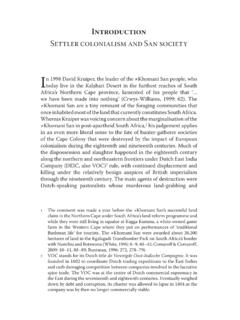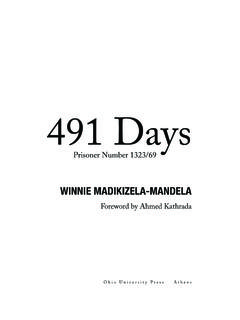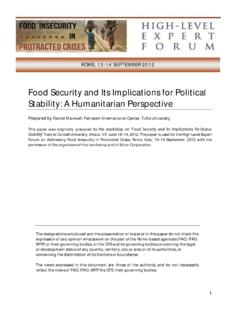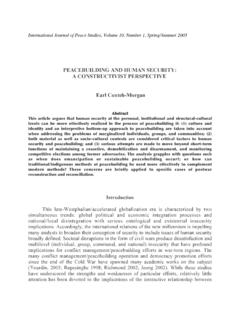Transcription of The Roots of African Conflicts: The Causes and Costs ...
1 Violent conflicts of one type or another have afflicted Africa and exacted aheavy toll on the continent s societies, polities and economies, robbing themof their developmental potential and democratic possibilities. The Causes ofthe conflicts are as complex as the challenges of resolving them are their Costs cannot be in doubt, nor the need, indeed the urgency, toresolve them, if the continent is to navigate the twenty-first century moresuccessfully than it did the twentieth, a century that was marked by thedepredations of colonialism and its debilitating legacies and destructive post-colonial disruptions. The magnitude and impact of these conflicts are oftenlost between hysteria and apathy the panic expressed among Africa sfriends and the indifference exhibited by its foes for a continent mired in,and supposedly dying from, an endless spiral of distor-tions that mar discussions and depictions of African conflicts are rooted inthe long-standing tendency to treat African social phenomena as peculiarand pathological, beyond the pale of humanity, let alone rational explana-tion.
2 Yet, from a historical and global perspective, Africa has been no moreprone to violent conflicts than other regions. Indeed, Africa s share of themore than 180 million people who died from conflicts and atrocities duringthe twentieth century is relatively modest: in the sheer scale of casualtiesthere is no equivalent in African history to Europe s First and Second WorldWars, or even the civil wars and atrocities in revolutionary Russia andChina. The worst bloodletting in twentieth-century Africa occurred duringthe colonial period in King Leopold s Congo Free State (White 2003). This is not to underestimate the immense impact of violent conflicts onAfrica. It is merely to emphasize the need for more balanced debate and com-mentary, to put African conflicts in both global and historical only are African conflicts inseparable from the conflicts of the twentiethcentury the most violent century in world history; many postcolonialconflicts are rooted in colonial conflicts .
3 There is hardly any zone of conflictin contemporary Africa that cannot trace its sordid violence to colonialhistory and even the late nineteenth century. For instance , to quote NielsKastfelt (2005:2), the region from the southern Sudan through northernUganda to Rwanda, Burundi, and Congo now the scene of brutal civil1 IntroductionThe Causes & Costs of War in AfricaFrom Liberation Struggles to the War on Terror PAUL TIYAMBE ZELEZA nhema&zeleza 00intro-pref 24/9/07 10:12 Page 1wars and genocide has a long history of colonial violence in the form ofslave trading, slave labor, plantation labor, plantation terror and a violentgun culture which all have to be taken into account when explaining thecontemporary situation.
4 Thus, it cannot be overemphasized that Africanconflicts are remarkably unexceptional: they have complex histories; theyexhibit multiple and multidimensional Causes , courses and consequences. The papers in this two-volume collection seek to advance ourunderstanding of African conflicts by going beyond the conventional andfashionable analyses of Africanist scholarship, often inflected with, if notinfected by, Afropessimism, or the simplistic stereotypes conveyed in theWestern media that are infused with Afrophobia. The first volume examinesthe Causes and Costs of violent conflicts in Africa, and the second focuseson the challenges of conflict resolution and post-conflict sophisticated theoretical insights and rich empirical details, theauthors, collectively, illuminate the forces and factors that generate violentconflicts and the effects that these conflicts have on socioeconomic develop-ment, political stability, democratic freedoms, human rights, culturalprogress, and even environmental sustainability.
5 There can be no singularexplanation for or solution to Africa s conflicts . At best, one can only saythat these conflicts are rooted in the complex constructions and con-junctures of Africa s political economies, social identities, and culturalecologies as configured out of specific local, national, and regional historicalexperiences and patterns of insertion into, and engagement with, an ever-changing world system. In so far as the Causes of the conflicts are multiplein their dynamics internal and external, local and transnational,economic and political, social and cultural, historical and contemporary,objective and subjective, material and ideological, concrete and emotive,real and rhetorical the strategies for managing and resolving them canonly be multidimensional.
6 This collection of essays is as strong inunraveling the sources of violent conflict in postcolonial Africa as it is inunveiling the various conflict resolution mechanisms that have been triedacross the continent, and in showcasing the successes and failures ofseveral post-conflict reconstruction efforts. Its strength lies in the sobrietyand seriousness of its analysis and the solutions proffered that transcend thefacile observations often encountered in the academic literature and Introduction is divided into three parts. First, I provide a broadhistoriographical survey of the typologies of wars in Africa in which Idistinguish between five types, namely, what I call imperial wars, anti-colonial wars, intra-state wars, inter-state wars, and international , I look at the current US war on terror , its Causes , its connectionswith Africa s other wars, and its unfolding consequences for the , I examine the political economy and cultural ecology of war, singlingout the political and structural dynamics of African wars, their economicand social dimensions, gender inflections and implications, theirtransnational and imperial contexts, and their Costs and consequences.
7 Subjects on which the chapters in this volume concentrate. In theconclusion, I briefly explore other critical aspects of African wars, especiallythe generational, religious and diasporic dimensions of these wars. 2 Paul Tiyambe Zelezanhema&zeleza 00intro-pref 24/9/07 10:12 Page 2 Typologies of War in Twentieth-Century Africa During the twentieth century Africa was ravaged by wars of one type oranother. Some of them, especially the liberation wars, were part of themomentous mission to remake African societies, to regain Africa s historicalagency so cruelly seized by Europe through colonialism. At the dawn of thetwenty-first century Africa, is faced with a new form of war even as itdesperately seeks to quench the wars of the last century.
8 This is the US-led war on terror , a crusade that knows no spatial or temporal bounds, sparesno expense, leaves a trail of wanton destruction, and wreaks havoc on theinfrastructures of global order, development and democracy. To date, twogovernments have been toppled, the Taliban in Afghanistan and SaddamHussein s regime in Iraq, by savage wars of conquest reminiscent of thewars of colonization of a bygone era. Africa s wars since the late nineteenth century can be differentiated interms of their causal factors and dynamics, spatial scales and locations,temporal scope and duration, composition of perpetrators and combatants,military equipment and engagements deployed, impacts on military andcivilian populations, and consequences on politics, the economy, society,the environment, and even on cultural structures and mental states asmediated and filtered, as all social processes and practices are, through theenduring and hierarchical inscriptions of gender, class, age, ethnicity, andsometimes race and religion.
9 Each of these dimensions could be singled outfor analytical and classificatory purposes. In this essay, I distinguishbetween five types of wars, basing the distinction primarily on their politicalthrust and ideological tendencies: imperial wars, anti-colonial wars, intra-state wars, inter-state wars, and international cannot be over-emphasized, however, that in reality there are close and complexinterconnections between these wars. Nevertheless, the classification doeshave heuristic value. According to this schema, the war on terror is notnew; it exhibits various characteristics of four of the five typologies,especially imperial and international wars. For each of these typologies further subdivisions can be made.
10 Threemain forms of imperial wars can be identified in twentieth-century Africanhistory. The first two, the First and Second World Wars, were fought whenmuch of Africa was still under colonial rule. African involvement in the twowars consisted, first, of providing troops, second, of serving as a theatre ofwar, and third, of the mobilization of production for the war effort. Hundredsof thousands of people from the colonies were conscripted into colonialarmies or incorporated into metropolitan armies to fight on behalf of theirimperial power against the other European powers, and, in the case of theSecond World War, against imperial Japan as well. During the First WorldWar parts of East and West Africa served as important theaters of war, whileNorth Africa was a crucial combat zone during both wars.







